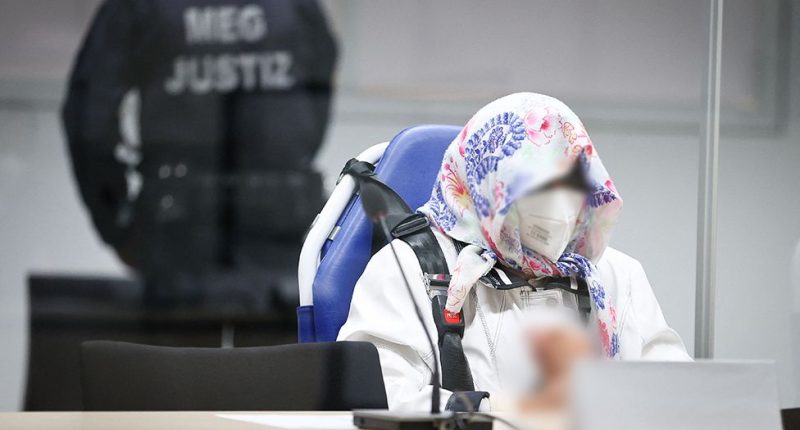A former secretary who worked for the commander of a Nazi concentration camp has been convicted of complicity in the murders of more than 10,505 people.
Irmgard Furchner, 97, was taken on as a teenaged typist at Stutthof and worked there from 1943 to 1945.
Furchner, one of the few women to be tried for Nazi crimes in decades, was given a two-year suspended jail term.
Although she was a civilian worker, the judge agreed she was fully aware of what was going on at the camp.
Some 65,000 people are thought to have died in horrendous conditions at Stutthof, including Jewish prisoners, non-Jewish Poles and captured Soviet soldiers.
Stutthof, located near the modern-day Polish city of Gdansk, used a variety of methods to murder its detainees and thousands died in gas chambers there from June 1944.
The court at Itzenhoe in northern Germany heard from survivors of the camp, some of whom have died during the trial.
When the trial began in September 2021, Irmgard Furchner went on the run from her retirement home and was eventually found by police on a street in Hamburg.
Stutthof commandant Paul-Werner Hoppe was jailed in 1955 for being an accessory to murder and he was released five years later.
A series of prosecutions have taken place in Germany since 2011, after the conviction of former Nazi death camp guard John Demjanjuk set the precedent that being a guard was sufficient evidence to prove complicity.
That ruling also meant that civilian worker Furchner could stand trial, as she worked directly to the camp commander, dealing with correspondence surrounding Stutthof detainees.
It took 40 days for her to break her silence in the trial, when she told the court “I’m sorry about everything that happened”.
As she was under 21 at the time, the trial took place in a special juvenile court. “I regret that I was in Stutthof at the time – that’s all I can say,” she said.
Her defence lawyers argued she should be acquitted because of doubts surrounding what she knew, as she was one of several typists in Hoppe’s office.
However, historian Stefan Hördler played a key role in the trial, accompanying two judges on a visit to the site of the camp. It became clear from the visit that Furchner was able to see some of the worst conditions at the camp from the commandant’s office.
The historian told the trial that 27 transports carrying 48,000 people arrived at Stutthof between June and October 1944, after the Nazis decided to expand the camp and speed up mass murder with the use of Zyklon B gas.
Mr Hördler described Hoppe’s office as the “nerve centre” for everything that went on at Stutthof.
Furchner’s trial could be the last to take place in Germany into Nazi-era crimes, although a few cases are still being investigated.
Two other cases have gone to court in recent years for Nazi crimes committed at Stutthof.
Last year a former camp guard was declared unfit for trial even though the court said there was a “high degree of probability” he was guilty of complicity.
In 2020, another SS camp guard, Bruno Dey, was given a two-year suspected jail term for complicity in the murder of more than prisoners.
Source:bbc.com





